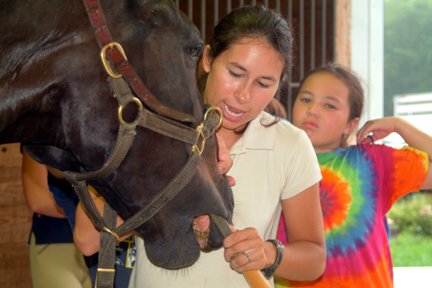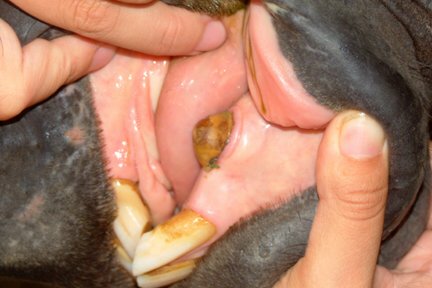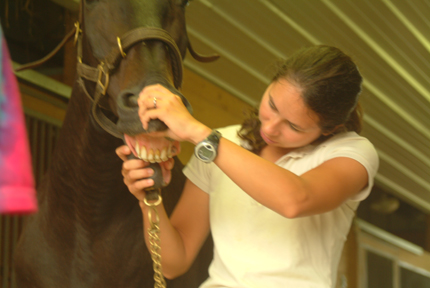|
Basic Health Float- Usually does not require sedation. This procedure
uses hand files or "floats" to file off the sharp edges of the molars
and premolars of the upper and lower jaws. The procedure enables the
horse to be more comfortable eating and prevents sores from developing
in the mouth. Basic floating is usually sufficient for pleasure and
companion horses. Floating should be done at 6 month intervals for
horses under 10 years of age and should start as yearlings. As the
horse gets older the teeth erupt at a slower rate and yearly floating
is sufficient as long as there are no abnoramlities.
|

|

|
Performance Float- Same as basic health float but pays more attention
to balance of the mouth and how the bit sits in the mouth. Hooks and
ramps are completely removed. The teeth closest to where the bit lies
are shaped so that the bit sits more comfortably in the mouth and so
there is enough room for cheek and tongue tissue around the bit.
Incisors are examined and TMJ syndrome is diagnosed. Horses that are in
competition or ridden heavily benefit greatly from a performance float.
Sedation is sometimes required if power equipment is needed.
|
|
Extractions- Teeth are pulled from the inside of the mouth. Deciduous
or "baby" teeth are often pulled with out sedation. They may need to be
pulled to prevent gaps between adult teeth and so that the adult teeth
come in straight. If they are left in they cause many problems later.
Wolf teeth are vestigial teeth that often lie in the bit area and
interfer with the bit. They can be removed when the horse is a yearling
or later. It is often recommended that wolf teeth are removed before
the horse is bitted. Moderate sedation is required to remove wolf
teeth. Infected teeth are also removed as needed. Sedation varies with
infected teeth.
|
|

|
Corrective Work- Often done with a special Dremel tool requires heavy
monitored sedation due to the vibration and noise involved. The
inscisors are usually the most common teeth to be corrected. They
become overlong due to soft grasses and hay. The result is reduced
molar contact. The most common sign that an incisor reduction is needed
is the horse chews with an open mouth. Bit seats and waves are more
easily and thouroughly corrected with a power tool than by hand
especially if the horse is in discomfort or the teeth are extremely
long.
|


